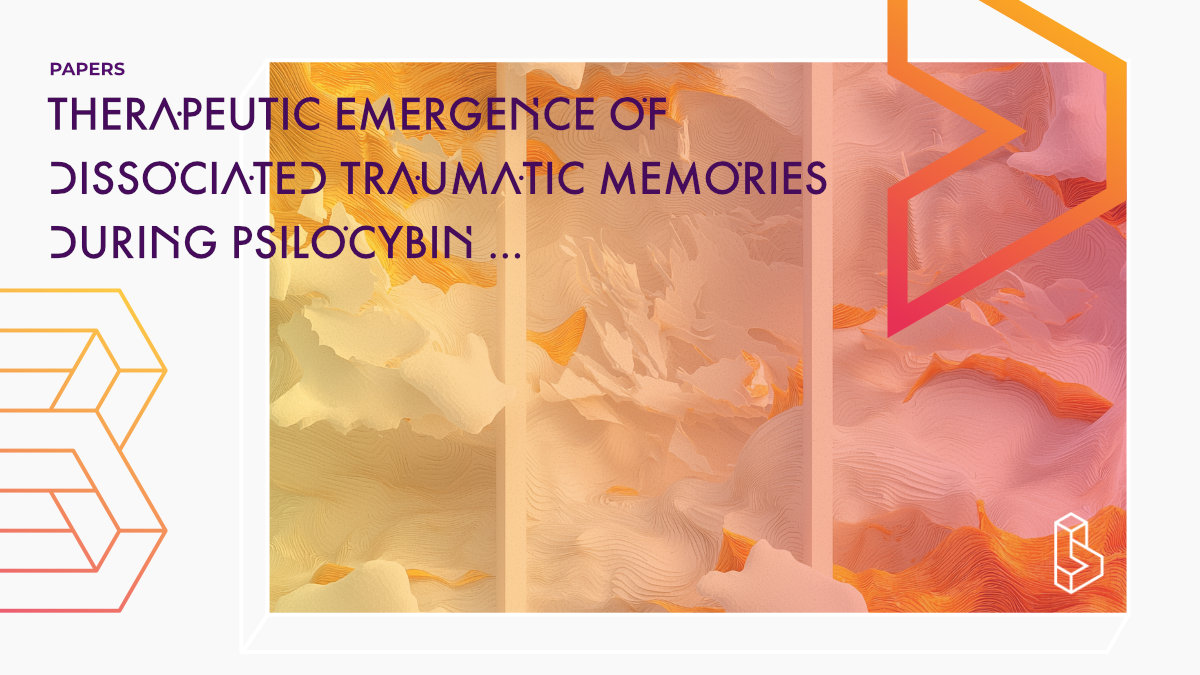This case study (n=2) of an open-label pilot study (n=10) explores psilocybin-assisted psychotherapy for women with anorexia nervosa (AN or partial remission). Two participants experienced the therapeutic emergence of previously dissociated traumatic memories, leading to remission of AN symptoms and meaningful weight gain at 3-month follow-up.
Abstract of Therapeutic emergence of dissociated traumatic memories during psilocybin treatment for anorexia nervosa
“Background Psychedelic treatment is a rapidly emerging therapeutic approach for a host of chronic, difficult to treat psychiatric disorders, including anorexia nervosa (AN). Trauma and its sequelae, such as dissociation, often contribute to comorbidity and treatment refractoriness.
Aims In this report, we describe the therapeutic emergence of previously dissociated traumatic memories of sexual assault in 2 of 10 research participants with AN while receiving psilocybin treatment.
Methods Ten female adults who met DSM-5 criteria for AN or pAN (partial remission) participated in an open pilot study evaluating the safety, tolerability and preliminary efficacy of psilocybin-assisted psychotherapy. Participants received a 25-mg dose of investigational drug COMP360, a proprietary pharmaceutical-grade synthetic psilocybin formulation developed by COMPASS Pathfinder Ltd. administered in conjunction with psychological support. Participants also received two integration therapy sessions on days 1 and 7 after dosing, and they were reassessed at 1 and 3 months. Participants were interviewed using a semi-structured interview to understand qualitative perspectives of treatment and its effect on AN.
Results/Outcomes Both patients described in this report significantly benefited from the emergence and processing of previously dissociated information (dissociative amnesia), and both patients subsequently attained remission of their AN psychopathology at 3-month follow-up as determined by global scores on the Eating Disorder Examination Questionnaire (EDE-Q) and clinically meaningful weight gain.
Conclusions/Interpretation PT may hold promise not only in the treatment of eating disorders but also trauma-related disorders, including PTSD and dissociative amnesia. Potential mechanisms of psilocybin’s facilitation of remembering and processing traumatic material is reviewed.”
Authors: Stephanie K. Peck, Timothy D. Brewerton, Hannah Fisher, Julie Trim, Samantha Shao, Nadav L. Modlin, Jessie Kim, Daphna M. Finn & Walter H. Kaye
Summary of Therapeutic emergence of dissociated traumatic memories during psilocybin treatment for anorexia nervosa
Psychedelic-assisted psychotherapy is being explored as a novel option for anorexia nervosa (AN), a life-threatening eating disorder characterised by extreme food restriction, low body-mass index (BMI) and an intense fear of weight gain. Earlier research shows that traumatic experiences and their after-effects—especially dissociation—often underlie chronic, treatment-resistant AN. Peck and colleagues note that dysregulation of the brain’s serotonin (5-HT) system links AN, post-traumatic stress disorder (PTSD) and anxiety conditions, suggesting a shared biological vulnerability. Classical psychedelics such as psilocybin act on serotonin 2A receptors and have been shown to dampen avoidance, enhance emotional processing and promote neural plasticity, all of which could help patients confront traumatic material. Against this backdrop, the authors set out to document an unexpected but clinically meaningful phenomenon: the spontaneous emergence of previously inaccessible memories of sexual assault during psilocybin treatment in two women with AN.
Methods
Participants
Find this paper
https://doi.org/10.1186/s40337-025-01274-2
Open Access | Google Scholar | Backup | 🕊
Cite this paper (APA)
Peck, S. K., Brewerton, T. D., Fisher, H., Trim, J., Shao, S., Modlin, N. L., ... & Kaye, W. H. (2025). Therapeutic emergence of dissociated traumatic memories during psilocybin treatment for anorexia nervosa. Journal of Eating Disorders, 13(1), 1-10.
Study details
Compounds studied
Placebo
Topics studied
Eating Disorders
PTSD
Study characteristics
Original Re-analysis
Open-Label
Case Study
Re-analysis
Participants
10
Humans
Compound Details
The psychedelics given at which dose and how many times
Psilocybin 25 mg | 1xLinked Research Papers
Notable research papers that build on or are influenced by this paper
Psilocybin therapy for females with anorexia nervosa: a phase 1, open-label feasibility studyThis open-label feasibility study (n=10) examines the effects of a single dose of psilocybin (25mg; COMP360) on adult female participants diagnosed with Anorexia Nervosa (AN) or pAN (partial remission). Results show that the treatment was safe, tolerable, and acceptable, with no significant changes in ECG, vital signs, or suicidality. However, two participants developed asymptomatic hypoglycemia (low blood sugar), which resolved within 24 hours. No significant changes in BMI were found.
Linked Clinical Trial
Evaluation of Psilocybin in Anorexia Nervosa: Safety and EfficacyThe primary aim of this study is to assess the safety and tolerability of one 25 mg dose of psilocybin in participants with anorexia nervosa based on adverse events (AEs), changes in vital signs, electrocardiograms (ECGs) and clinical laboratory tests. The secondary objectives are to explore the efficacy of a single 25 mg dose of psilocybin on eating disorder symptoms and behaviors, body image, anxiety, food related obsessions and rituals, and body weight.

